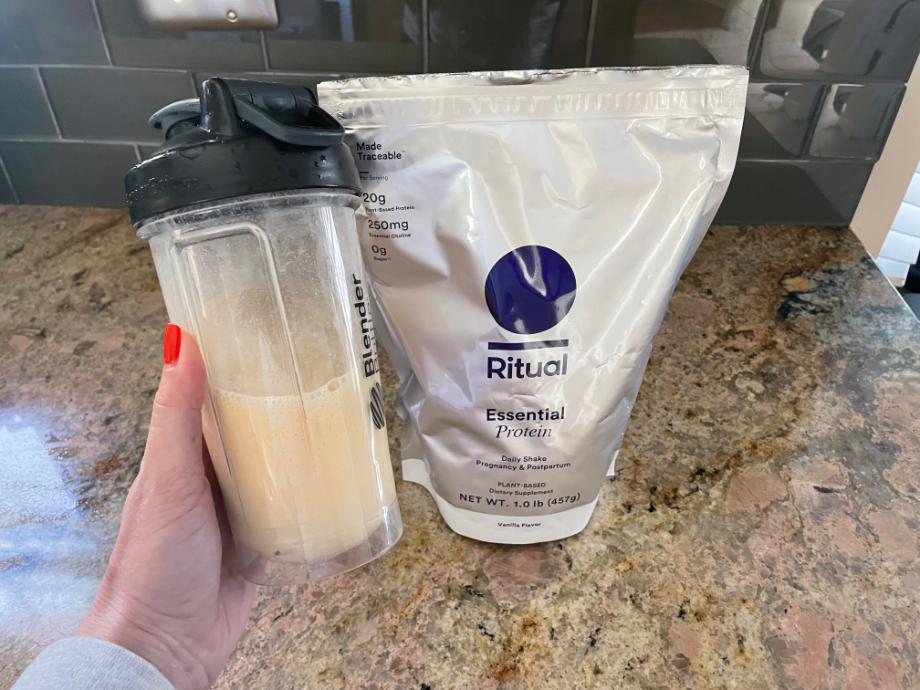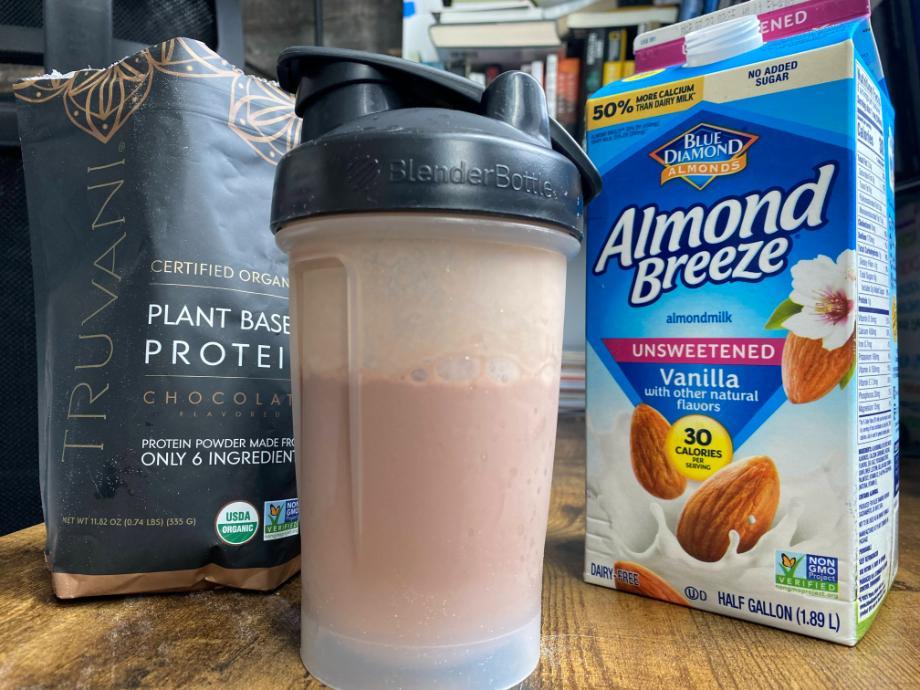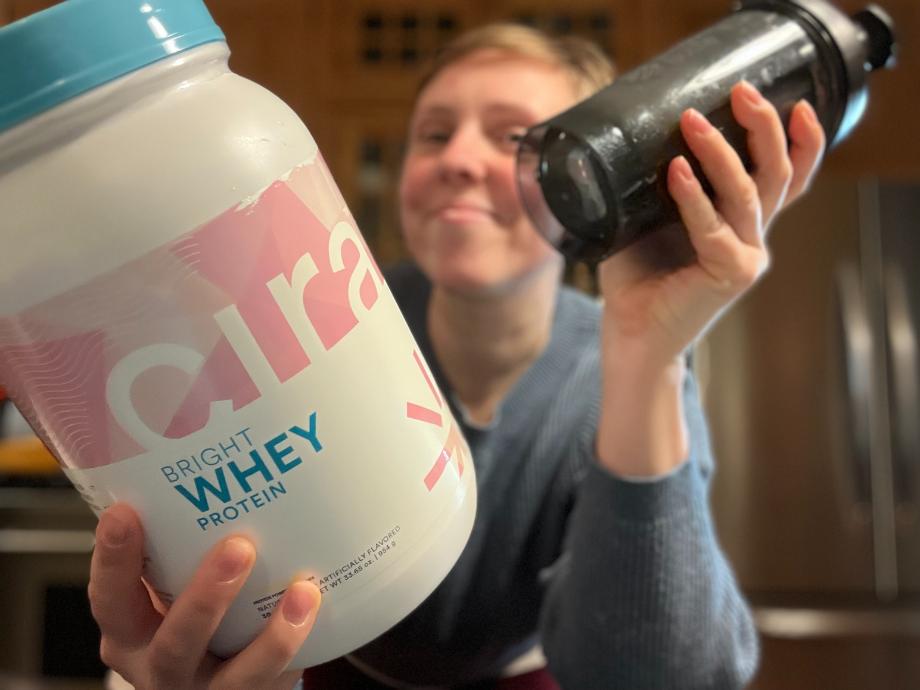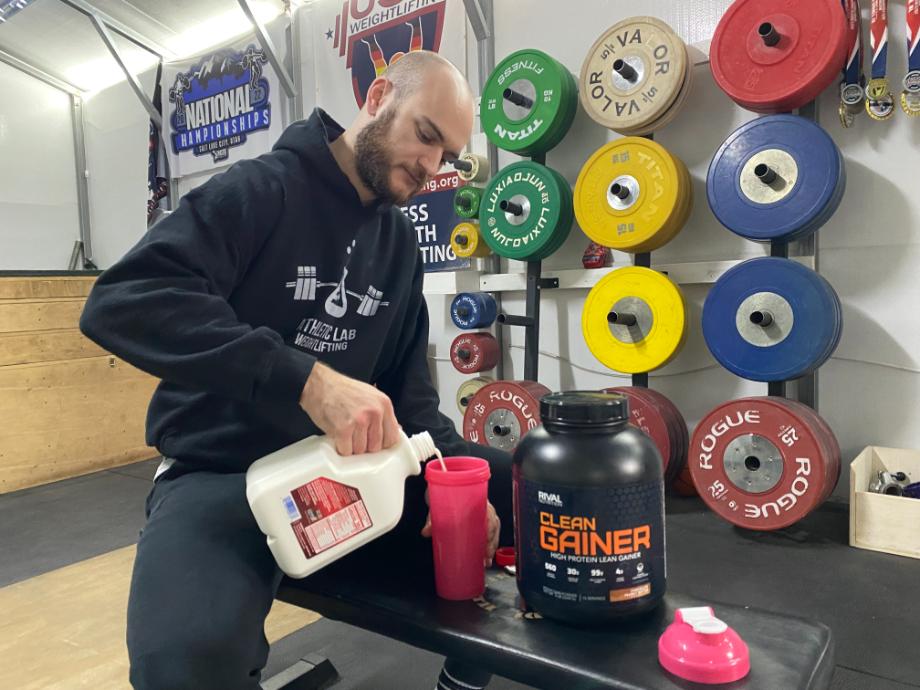We test and review fitness products based on an independent, multi-point methodology. If you use our links to purchase something, we may earn a commission. Read our disclosures.
If you’re looking to maximize your results in the gym, adequate protein intake is essential for the best recovery and muscle growth. If you struggle to eat enough solid food, protein shakes are a great way to boost your daily protein intake and supply the amino acids for optimal muscle recovery after lifting weights.
However, before you mix your protein powder, you’ll want to make sure you’re doing things the right way for your goals, and protein supplements can be confusing. If you check the label on many of the best protein powders, the instructions may tell you to mix your powder with water or milk, which are obviously two very different things.
In this guide, I’ll help you get to the bottom of things, and help you decide if mixing your protein shake with milk or water will be best for your goals.
Nutrition Coaches Share Their Thoughts
Getting your nutrition advice from the internet can be scary, which is why you should always look for credible sources. I’ve been working as a coach and trainer in the fitness industry since 2012, and I’m also a Precision Nutrition Level 1 coach. I’ve been using protein powder nearly every day for close to fourteen years.
I also spoke with Sydney Lappe, MS, RDN, LDN, a registered dietitian and experienced Garage Gym Reviews writer, who shared her thoughts on the milk vs water debate, offering insights from a clinical background.
Key Differences Between Using Milk and Water
In the world of nutrition, it’s quite difficult, if not impossible, to make a definitive statement that something is the “best” approach. Mixing your protein with milk or water is going to depend on a few factors unique to you, like your current goals and personal preferences, so there’s no one-size-fits-all recommendation.
However, before we get into how to choose the right one, let’s look at the clear differences, which can help you determine which liquid is best for your next protein shake.

Consistency
When mixing protein powder in a shaker cup, the type of liquid you use will have a direct impact on the texture and consistency.
We’ve tested over 110 protein powders, often mixing them with both water and milk. Mixing with water usually results in a thinner, lighter consistency, while milk usually results in a thicker, creamier shake.
If you prefer a thicker consistency, you may prefer milk, while those who prefer a lighter shake may want to use water. With milk, the whey protein shake may be harder to completely mix, so you may need to use a shaker cup with a blender ball to get everything fully dissolved.
Nutritional Content
The biggest and most important difference will be the nutritional content of your shake. While water doesn’t contain any nutrients, milk will always add calories and macronutrients to your shake, as well as boost minerals like calcium and magnesium.
Using dairy milk will add extra protein, carbs, and possibly fat to your shake, depending on the type of milk. For example, the USDA food database shows that one cup of skim milk contains 83.3 calories, 12.6 grams of carbohydrates, and 8.26 grams of protein. If you use whole milk, one cup provides 146 calories, eight grams of protein, 11.4 grams of carbs, and 7.81 grams of fat.
Sydney Lappe, RD, pointed out that if you’re going to use plant-based milk like oat, almond, or soy milk, you’ll have other factors to consider as well that can fluctuate based on the type of milk, such as protein content, or added sugars and oils.
If you’re looking to build muscle mass, you may benefit from the extra calories you’ll receive from mixing your shake with milk, which also provides extra protein. However, if you’re currently focusing on weight loss, you may want to stick with water or choose a lower-calorie plant-based option, like almond milk.

Digestion Speed
Adding milk to your protein shake can slow down digestion compared to water, as dairy milk may contain fats, as well as casein, which digests slower1 than whey protein.
If you’re using a whey isolate specifically for fast digestion as a pre-workout or post-workout option, know that adding milk may slow digestion. However, Sydney pointed out that this may be beneficial if you’re not worried about the digestion speed, since the fats and slower digestion may help improve satiety, or how full you feel after drinking a shake.
RELATED: Casein Protein vs Whey
If you tend to struggle with hunger and cravings between meals, mixing your next scoop of protein powder with a cup of milk, rather than water, may be just what you need to keep your stomach happy.
Lactose Content
Using dairy milk, like cow’s milk, will add lactose to your shake, which may bother those with lactose intolerance. Many whey isolates have most of the lactose removed or added digestive enzymes, and non-dairy plant-based powders are lactose-free.
If you’re used to using these types of protein, know that mixing your powder with milk may cause digestive issues if you’re sensitive to dairy. Some people with mild dairy sensitivities, like myself, find that whey isolates in water don’t cause issues, but adding milk causes an upset stomach.
RELATED: Best Vegan Protein Powder
Convenience
Convenience is also another big factor. Many of us take protein powder and shaker cups to work or the gym, and it may be difficult to bring milk with you, unless you have a cooler or refrigerator. Finding water to mix your shake may be much more convenient wherever you are, as many places will have free water available.
How to Decide Between Using Milk and Water
Now that we’ve covered the main differences between mixing your protein shake with milk or water, let’s look at what specific questions you should be asking yourself before making a decision.
What Are Your Current Fitness Goals?
If you’re looking to lose some fat, which requires a calorie deficit, you’ll probably want to use water. This will minimize excess calories, and you’ll still get all the benefits of consuming enough protein.

For those looking to gain weight and build lean muscle mass, milk may be the better option. Not only will adding milk increase your calorie intake, but milk contains both additional protein as well as carbohydrates, and pairing carbohydrates with protein before or after a workout has been shown2 to result in greater muscle protein synthesis than protein alone.
Many of the best mass gainers specifically advise that you mix your shake with milk, specifically to add more calories to each serving, as bodybuilding goals typically require high protein intakes, along with plenty of calories to gain weight.
Taste Preference
Dietary preferences vary greatly from person to person. If you like thick, creamy shakes, mixing your protein powder with milk is a great option. However, if you’re not a fan of textures, and prefer a lighter, thinner consistency, using water may be the better choice for you.
While we’re talking about flavors, be sure to check your protein flavor as well. Common flavors like chocolate, vanilla, and cookies and cream will probably taste great with milk, but unique fruity flavors—especially the best clear whey protein drinks—may not taste all that great with dairy.
Budget
While milk is generally inexpensive, water is free. If you’re drinking lots of protein shakes throughout the week, you may find yourself going through gallons of milk faster than you’d like, which could add to your grocery bill.
If you’re on a tight budget, sticking with water for your shakes can help you save some money.
Protein Shake with Milk or Water: Final Thoughts
Ultimately, mixing your protein shake with milk or water comes down to your current goals, as well as your dietary preferences. Either way, you’ll be receiving the benefits of using a protein powder, and the liquid you choose can support your goals.
Mixing protein powder with water is best for those on a fat loss plan or anyone who likes thinner shakes, while mixing with milk is better for anyone focused on muscle growth, or people who prefer a thicker shake.
Protein Shake with Milk or Water: FAQs
Are protein shakes better with water or milk?
There are pros and cons to both. Mixing with water will save calories, but the shake will have a thinner consistency, while using milk often makes the shake taste a little better, but adds calories and macros.
Do protein shakes taste good with milk?
Yes. Taste is subjective, but most people find that protein shakes, especially flavors like chocolate and vanilla, taste very good with milk. Certain fruity flavors or clear whey protein drinks may not taste very good with milk.
Can I just mix protein powder with water?
Yes, protein powder can be mixed with water alone, though you may need to use a shaker cup or mixer to make sure the protein is fully dissolved.
What happens if you put too much water in a protein shake?
Nothing will happen to your protein, but the texture and taste may change. Using too much water can result in a thin, bland shake that doesn’t have very much taste.
References
- Kim J. Pre-sleep casein protein ingestion: new paradigm in post-exercise recovery nutrition. Phys Act Nutr. 2020;24(2):6-10. doi:10.20463/pan.2020.0009
- Kerksick C, Harvey T, Stout J, et al. International Society of Sports Nutrition position stand: nutrient timing [published correction appears in J Int Soc Sports Nutr. 2008;5:18]. J Int Soc Sports Nutr. 2008;5:17. Published 2008 Oct 3. doi:10.1186/1550-2783-5-17
Further reading

Both types of rowing have their own pros and cons. Here we’ll discuss the major differences between indoor and outdoor rowing. Read more

Looking to add some variation to your weightlifting regimen? Check out our CPT-selected Smith machine workouts for a fresh way to get in your strength training! Read more

A thinner bumper plate made with quality virgin rubber. See more in our Rogue Echo Bumper Plates review on these budget friendly plates. Read more

Pump up your protein intake without neglecting fiber and healthy fats: Discover if Huel Black is your ideal meal replacement with our full Huel review. Read more

